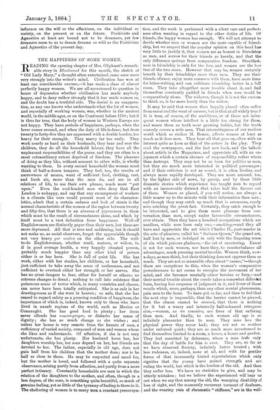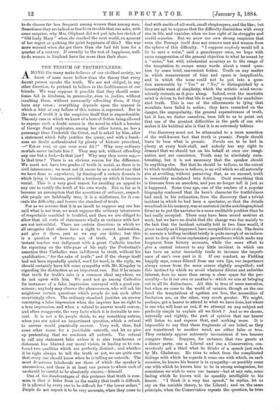THE HAPPINESS OF SOME WOMEN.
READING the opening chapter of Mrs. Oliphant's remark- able story in Blackwood for this month, the sketch of " Old Lady Mary," a thought often entertained came once more very strongly into the writer's mind. Civilisation has won at least one considerable success,—it has made a class of almost perfectly happy women. We are all accustomed to question in hours of depression whether civilisation has made anybody happy, and to deny rather strongly that it has made women so, and the doubt has a truthful side. The denial is an exaggera- tion, as any one knows who understands what the lot of women, and especially of working women, was, whether in the ancient world, in the middle ages, or on the Continent before 1789; but it is thus far true, that the body of women in Western Europe are not happy. They have periods of happiness, perhaps, when the lover comes around, and when the duty of life is done; but from twenty to forty-five they are oppressed with a double burden, too heavy for their strength. They marry far too early. They work nearly as hard as their husbands, they bear and rear the children, they do all the household labour, they have all the unpleasant responsibilities of the purse, and they are often to a most extraordinary extent deprived of freedom. The pleasure of doing as they like, without account to other wills, is wholly wanting to them. In every second household the woman must think of half-a-dozen tempers. They feel, too, the results of narrowness of means, want of sufficient food, clothing, rest, and fresh air, more than the men do, and are in all relations of life, to use their own phrase, much more "put upon." Even the cool-headed men who deny that East London is unhappy, and say that any encampment of workers in a climate like ours would present most of its character- istics, admit that a certain sadness and look .of strain is the normal characteristic of the women of the region between twenty and fifty-five, that there is an absence of joyousness in them which must be the result of circumstances alone, and which by itself must be a vast deduction from happiness. Well-off Englishwomen are distinctly gayer than their men, but these are more depressed. All that is true and saddening, but it should not make us, as social observers, forget the appreciable though not very heavy per contra on the other side. The well- to-do Englishwoman, whether maid, matron, or widow, is, if in good average health, a very happily situated person, probably much happier than any other kind of person
either is or has been. She is full of quiet life. She has work, either with her studies, her children, or her household, just sufficient to take away the sense of uselessness, and not sufficient to overtask either her strength or her nerves. She has no great dangers to fear, either for herself or others ; no extreme changes to dread ; nothing to call into existence that poisonous sense of terror which, in many countries and classes, can never have been totally extirpated. She is as safe in her drawing-room as if she were in heaven ; so safe, that she has ceased to regard safety as a pressing condition of happiness, the importance of which is, indeed, known only to those who have lived in unsafe regions of the world, such as Mexico or Connaught. She has good food in plenty ; her dress never offends her amour-propre, or disturbs her sense of dignity ; she has as much change as she wishes ; and 'unless her house is very remote from the haunts of men, a sufficiency of varied society, composed of men and women whom she likes and understands. Of affection, if she is not very unfortunate, she has plenty. Her husband loves her, her daughters worship her, her sons depend on her, her friends are devoted to her. The father, especially in old age, does not gain half from his children that the mother does ; nor is he half so close to them. He may be respected and cared for, but the mother is loved, and followed with a quite separate observance, arising partly from affection, and partly from a more perfect intimacy. Constantly households are seen in which the relation of the daughters to the mother, and often, though in a less degree, of the sons, is something quite beautiful, so much of genuine feeling, yet so little of the tyranny of feeling is there in it. The sheltering of women is to many men a constant preoccupa- tion, and the work is performed with a silent care and perfect- ness often wanting in regard to the other duties of life. Of Mends, the happy woman has enough. We will not attempt to decide whether men or women are the more capable of friend- ship, but we suspect that the popular opinion on this head has very little to justify it, that women are as honest in friendship as men, and sorrow for their friends as keenly, and that the only difference springs from comparative freedom. Steadfast- ness in friendship is only for the free, and women are the less free of the two sexes. However that may be, women certainly benefit by their friendships more than men. They see their friends oftener, enjoy more converse with them, have more time for letter-writing, and can cultivate friendship better in a full room. They take altogether more trouble about it, and find themselves constantly padded in friends when men would be comparatively alone. The widower, though it is not the custom to think so, is far more lonely than the widow.
It may be said that women thus happily placed often suffer from ennui and the want of careers, but is that at all widely true ? It is true, of course, of the ambitious, or of those not infre- quent women whose intellect is a little too strong for them, and wears them as teeth wear growing babies, but the truth scarcely covers a wide area. That interestingness of our modern world which so strikes M. Renan, affects women at least as much as it does men. They hear all that goes on, often with an interest quite as keen as that of the actors in the play. They read the newspapers, and the last new book, and the talked- about article in the Magazines, and appreciate all, with an en- joyment which a certain absence of responsibility rather whets than destroys. They may not be as keen for politics as men, but they are much more interested in political personages ; and if their criticism is not as sound, it is often livelier, and always more rapidly developed. They are more amused, too, by the lighter side of news, by gossip, and by those little dramatic stories which experience has taught men to regard with an immoveable distrust that takes half the flavour out of them. Women so placed, if you will notice, are always a little nearer up to the minute with their information than men ; and though they may catch up much that is erroneous, rarely miss catching the pivot fact. Certainly, they catch enough to be interested, and to give them more pleasure from con- versation than men, except under favourable circumstances, ever obtain. Then they have a hundred occupations which are needless, while men have only one,—smoking,—and they all have and appreciate the art which Charles II., past-master in the arts of pleasure, called his " Sultana-Queen," the grand art, half lost by men, or indulged in only with the lingering sense of sin which poisons gladness,—the art of sauntering. Ennui is not for such women, nor have they, to counterbalance all advantages, much pressing mental trouble. Women think, now- a-days, as men think, but their thinking does not oppress them so much. They are not so miserable often about" causes,"—though there are exceptions to this, when the woman's comparative powerlessness to act seems to energise the movement of her mind, and she becomes mentally either heroine or fury,—and their mental trouble about the creeds takes a somewhat differtint form, having less suspense of judgment in it, and fewer of those recoils which, more, perhaps, than any other mental phenomena, pain men to the bone. To have got so far, and then to feel that the next step is impossible, that the barrier cannot be pierced, that the chasm cannot be crossed, that there is nothing for it but a weary and internally half-ashamed retrogres- sion,—women, as we conceive, are freer of that suffering than men. And finally, to such women old age is so infinitely pleasanter than to men. They miss less the physical power they never had ; they are not so restless under enforced quiet ; they are so much more accustomed to find themselves limited to a room, a house, a house and garden. They feel cossetted by deference, where a man feels only that the day of battle for him is over. They are, so far as we have observed Society, infinitely better treated ; with less rudeness, or, indeed, none at all, and with far gentler forms of that incessantly hinted expostulation which only signifies that the young have gained strength and are ruling the world, but which is the burden of the old. And then they suffer less. We have no statistics to give, and may be utterly mistaken ; but we believe the experienced will bear us out when we say that among the old, the wearying disability of loss of sight, and the momently recurrent torment of deafness, and the wearing pain of rheumatic " stiffness," are in the well-
to-do classes far less frequent among women than among men. Sometimes they are indeed so free from trouble that one asks, with some surprise, why Mrs. Oliphant did not put into her sketch of " Old Lady Mary " when she reached the next world, an apcount of her regret at quitting the quiet happiness of this ? She was more worried when she got there than she had felt here for a qiiarter of a century. If serenity be the test of happiness, well- to-do women in England have far more than their share.







































 Previous page
Previous page